Introduction
LSE has strong connections with figures who played a key part in the establishment of the welfare state, consequently the Library holds many materials that chart the story of social security in the UK. From Charles Booth and the Webbs to, most notably, Beveridge and beyond, the arguments about how to enable the effective distribution of wealth in order to provide support for those in need can be traced and explored via our rich and unique collections.
>The Poor Law>
Before reforms were made by governments in the twentieth century, people who were in need of assistance as a result of poverty were often covered by legislation known as the Poor Laws. The Act for the Relief of the Poor from 1601 is commonly regarded as the first piece of legislation in a lengthy chain. The system was eventually abolished by the National Assistance Act of 1948.
COLL MISC 0505 (Volume 6) - contains the laws and statutes dating from 1662 to 1780 many of which relate to the poor laws.
There are several other collections in the Coll Misc section which contain primary source materials relating to the poor laws:
- Evesham Board of Guardians - a collection of letters revealing the decisions made by the Poor Law Board sent in response to requests for relief of the poor.
- Lancashire Townships Poor Relief - is a weekly record of the amount of poor relief paid to individuals living in various towns in outer Manchester.
- Irish Poor Law Records - a set of volumes containing records which relate to the poor law union from various towns in Ireland.
- A search in the archive catalogue can be carried out in the Description field for 'poor law' or 'poor relief' and then selecting 'Collection' in the Level field to locate the other related archives.
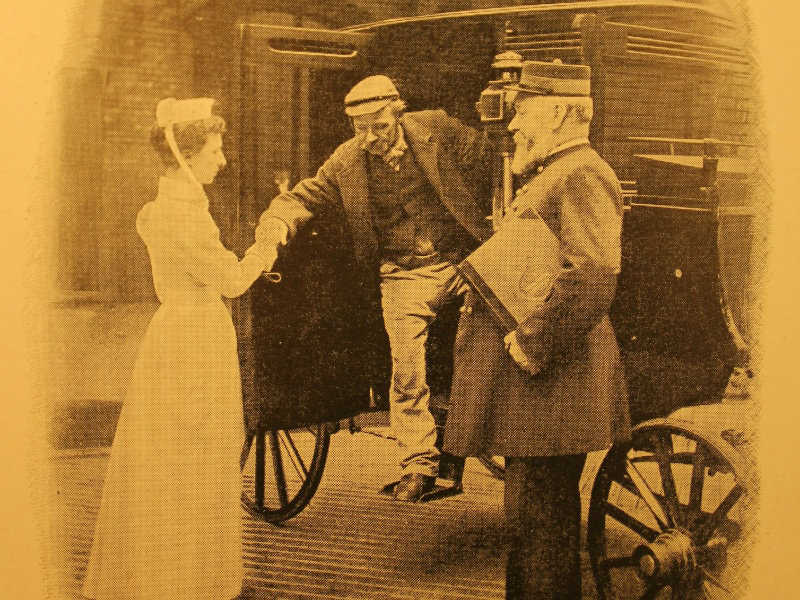 Image of a pauper taken from Living London, George R Simms, 1901
Image of a pauper taken from Living London, George R Simms, 1901
The case histories of various inmates of Stepney and Bromley workhouses were also recorded as part of the Charles Booth inquiry. Hundreds of testimonies were taken and each inmate was assigned a 'reason for pauperism'. Over 30% of inmates were there because of old age.
The papers of Kathleen Hill in The Women's Library archives record her involvement in administering the poor laws in the 1930s and then the National Assistance Board which superseded them.
The wider Library Search can also be used to locate relevant items in the print collections.
Movements against the poor laws
There are a number of collections in the archives which contain details of the movements against, or for the reform of, the poor laws, including papers in the Fabian Society's archives.
Beatrice and Sidney Webb were both closely involved in the movement to reform the poor laws particularly through their work as part of the Royal Commission on the Poor Laws and Relief of Distress 1905–09. Their radical recommendations for the reform of the poor laws was published in the Minority Report, although the Commission disagreed with the findings overall.
The Webbs were also key figures in the National Committee to Promote the Break Up of the Poor Law which became the National Committee for the Prevention of Destitutions and there are several files of materials which refer to these organisations.
The Independent Labour Party also campaigned against the poor laws and for their reform and such material can be found amongst the papers held in their archive.
Louisa Twinning was a noted poor law reformer and campaigner and sought to improve the conditions within workhouses and those faced by people who required relief. The Women's Library has a collection of letters written to Twinning some of which relate to this work.
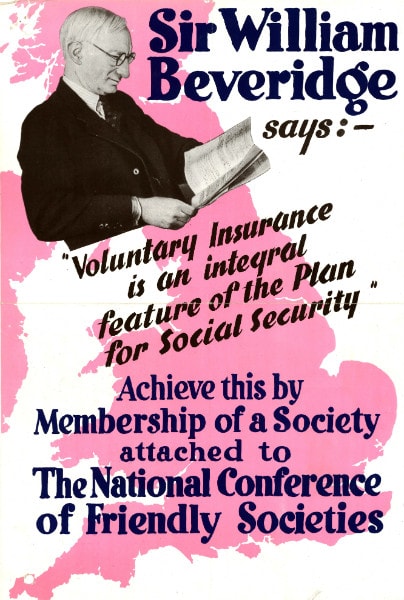 Poster for the National Conference of Friendly Societies
Poster for the National Conference of Friendly Societies
Charitable work and the Charity Organisation Society
Alongside the Poor Laws the other main method of providing for people who were in need was via charitable relief.
There are several collections that relate to the Charity Organisation Society which was founded in 1869 to effectively co-ordinate the provision of relief and better monitor relief given to individuals. Originally it went by the name Society for Organising Charitable Relief and Repressing Mendicity.
The organisation was founded by Henry Solly and there are a group of files which relate to his life and work as part of the Coll Misc collection.
The Women's Library also holds collections of women's charity organisations including the Records of the Women's University Settlement which, like other University Settlements, sought to bring university educated individuals into poorer communities in order to 'promote the welfare of the people of the poorer districts ... and especially of the Women and Children, devise and promote schemes which tend to elevate them physically, intellectually and morally, and give them additional opportunities for education and recreation'.
Another charity that was established to assist women was the National Council for One Parent Families which was created to support the welfare of unmarried mothers and their children. The organisation continues to operate as a charity for single parents called Gingerbread.
Liberal Reforms
The reforms brought in by the Liberal Governments of 1906-1914 marked a widescale effort to provide social protection for vulnerable people.
The reforms included the introduction of the first Old Age Pension for people over the age of 70; the introduction of free school meals and the first National Insurance Act to provide medical help and unemployment insurance for workers in certain heavy industries.
LSE holds the archive of the Liberal Party however many of the earlier records no longer survive and are not held. The archive does include the Agendas and Programs from the 1912 and 1913 party assemblies.
We also hold the personal papers of William Braithwaite, a civil servant who worked closely with David Lloyd George during the drafting of the National Insurance Act.
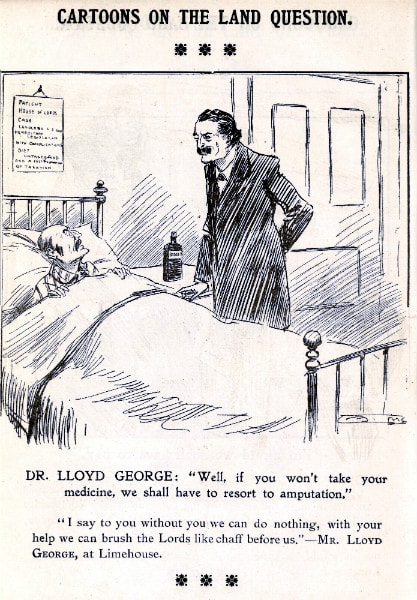 Image taken from Land Tax Cartoons, ... illustrating Mr. Lloyd-George's great speech at Limehouse, Morning Leader, 1909
Image taken from Land Tax Cartoons, ... illustrating Mr. Lloyd-George's great speech at Limehouse, Morning Leader, 1909
You can also find publications released by the Liberal Party between 1906-1914 on the Library Search catalogue.
William Beveridge
William Beveridge's report published in 1942 has been seen as laying the foundations for the welfare state. Beveridge's papers are at LSE and this includes a wealth of materials which deal specifically with his work chairing the Interdepartmental Committee on Social Insurance and Allied Services which carried out the research behind the report. These documents can be found in Beveridge/SIC.
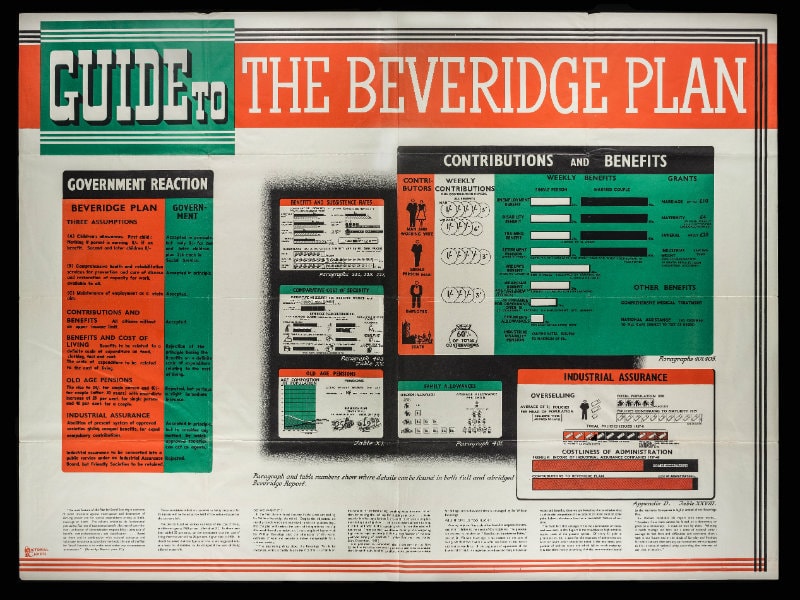 Guide to the Beveridge Plan poster, 1943
Guide to the Beveridge Plan poster, 1943
There are also many other items which reveal the work he had done years previously to campaign for and help establish Labour Exchanges, as well as his work to investigate unemployment and German models of unemployment insurance. A large number of these materials can be found in Beveridge/UNEMPLOYMENT and Beveridge/3.
Social Policy
LSE, and in particular the Social Policy and Sociology departments, played a clear role in the development of the welfare state during the twentieth century. In particular the work of several academics, namely Brian Abel-Smith, Richard Titmuss, Peter Townsend and Tony Lynes, helped provide rigourous evidentiary support and policy for the development of the welfare state for much of the second half of the twentieth century.
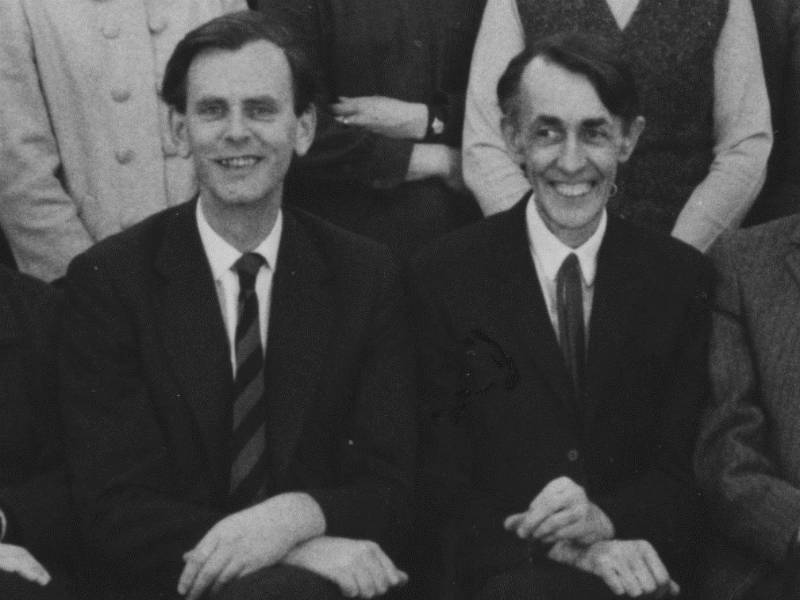 Brian Abel Smith (l) and Richard Titmuss (r) from a departmental photo
Brian Abel Smith (l) and Richard Titmuss (r) from a departmental photo
The papers of Brian Abel-Smith, Richard Titmuss and Tony Lynes are held in the archives.
Abel-Smith, Townsend and Lynes were also all key figures in the establishment of the Child Poverty Action Group. The organisations papers are also held in the archives however these are, as yet, uncatalogued.
Other items
There are a few other collections which relate also to the welfare state:
- Alf Morris was a Labour MP who played a crucial role in getting the Chronically Sick and Disabled Persons Act passed through Parliament in 1970. The Act placed the onus onto local authorities to ensure that they provided support services for people with disabilities within their areas of jurisdiction. Find relevant material on the catalogue.
- The Committee on One Parent Families (Finer Committee) was convened in 1969 in order to investigate support for single parents and how these could be improved. The findings were released in 1974 and these emphasised that that state had a responsibility to support one-parent families. The archive was donated to LSE by Morris Finer, the chair.
- The Centre for Policy Studies is a think tank which was established in the late 1970s which devised and provided policy recommendations for a variety of organisations, most notably the Conservative Party. Among the topics discussed are proposals and speeches which relate to the free market, welfare state and NHS.
- Juliet Rhys-Williams was a Liberal politician who published a pamphlet called Something To Look Forward To which included a proposal for a Basic Income scheme for all citizens in 1942, the same year as the Beveridge Report was released. Her papers include many items which relate to economic policy including tax reforms for social security and child allowances.
How to search
This is just a snapshot of the material we hold that covers this subject area. You can find these items and many more by using the various collection search tools.
Additional search terms for related material include: old-age pensions, National Health Service, free school meals, labour exchanges/employment exchange/job centre, National Insurance, family allowance/child benefit.
How to access
Most of the material highlighted here is part of our special collections, which are open to all but must be consulted in our reading room. Find out how to book your place and order material on our access archives and special collections page.
Further help
If you need specific help with any of the collections mentioned here get in touch with our Curator for Economics and Social Policy, Indy Bhullar. You can also find him on Twitter @EconomicCurator